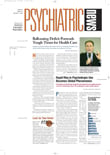We continue to make great progress in building the field of psychosomatic medicine. I just returned from a two-day board-review course organized by the Academy of Psychosomatic Medicine (APM) for the American Board of Psychiatry and Neurology's (ABPN) subspecialty examination in psychosomatic medicine. The first exam for certification in psychosomatic medicine will be administered in June 2005.
The course was directed by David F. Gitlin, M.D., with much support from Carol Alter, M.D., Jon Schuster, M.D., and Barbara Schindler, M.D., as well as APM President Theodore A. Stern, M.D., a superb faculty, and excellent staffing, directed by Evelyne A. Hallberg.
As those of you who are regular readers of this column know, I believe that this new subspecialty holds great promise for the future of psychiatry. Not only will the existence of the subspecialty lead to better care of patients because of the recognition that medical and psychiatric problems often occur together, but also it will drive the field to answer critical questions about the relationship of psychiatric illness to other medical illnesses.
One of the amazing aspects of the course was that psychiatrists of all ages, levels of experience, and clinical and research backgrounds attended on a voluntary basis to learn and prepare themselves for taking yet another examination. Some were even senior psychiatrists who have written best-selling books on consultation-liaison psychiatry—and who were probably capable of presenting the course lectures themselves from memory and experience! But no one gave any hint that they had more knowledge or experience than anyone else—all were there to learn and show solidarity for our new subspecialty.
To prepare for the presentations and to use later as a study guide, participants were given a binder containing the course slides and a companion CD-ROM. In addition, James Levenson, M.D., vice chair of APA's Council on Psychosomatic Medicine, recently completed an excellent textbook, the American Psychiatric Textbook of Psychosomatic Medicine, which was available at the course. The textbook was published earlier this year by American Psychiatric Publishing Inc. (APPI).
The course and well-designed materials demonstrate that APA, APPI, and APM have been working together to deliver the latest information to those who are already providing psychosomatic care and those who would like to be able to. The sure hands of Tom Wise, M.D., chair of APPI's Board of Directors, and Bob Hales, M.D., APPI's editor in chief, have helped in this effort.
Course topics ranged from psychiatric issues in cardiac disorders, substance use disorders in the medical setting, and psychosomatic issues in obstetrics/gynecology to psychopharmacology, psychiatric issues in transplantation, psycho-oncology, and psychosomatic issues in endocrinology.
Linda Worley, M.D., who gave the lecture on endocrinology, showed several vignettes of patients with Addison's disease and hyperthyroidism. She reviewed the differential diagnoses and observed that diagnosing these patients correctly was difficult; in the hands of less-skilled clinicians, they might have been diagnosed with anxiety or depression and perhaps died. Linda made the excellent point that psychologists who are given prescription privileges without a medical school education are likely to miss the medical illnesses that present with psychiatric symptoms.
Pauline Powers, M.D., spoke about psychiatric issues in the surgical setting, particularly in a trauma/burn unit, and the importance of psychiatrists “being there.” She noted that sometimes psychiatrists find it uncomfortable to work in a burn unit or certain other clinical settings, but when they do, they are very much appreciated by patients and their families, as well by other medical staff. Psychiatrists can make the difference in patients' being able to recover emotionally as well as physically from their trauma.
Dr. Stern reminded us about the various ways in which patients cope—or fail to cope—with illness, and how it is important to spend time to understand them and help their families and the other clinicians who are part of the team to provide better coping strategies.
Wayne Katon, M.D., presented some of the elegant research he has done in the area of anxiety in medically ill patients and noted that patients with panic disorder and phobias tend to make greater use of general medical services. He also touched on the relationship between panic disorder, chest pain, and irritable bowel syndrome and the importance of determining the autonomic dysfunction involved in the overlapping or similar pathways in these disorders.
By the end of the course, there was an incredible sense of optimism among course participants that the subspecialty of psychosomatic medicine is now on its feet and on its way. Many of us want to get board certification so that our academic institutions can apply to establish a residency program in psychosomatic medicine and help develop the next generation of psychosomatic subspecialists.
Under the guidance of Phil Muskin, M.D., chair of APA's Council on Psychosomatic Medicine, and Dr. Levenson, vice chair, I am very excited about the role APA has played in bringing this important subspecialty to this stage in its development. The collaborations in clinical research with our colleagues in cardiology, oncology, transplantation medicine, and surgery will be phenomenal. Medical students and residents are already excited that we have given them an opportunity for subspecialty training.
The theme for APA's 2005 annual meeting, which is being held in Atlanta May 21 to 26, is “Psychosomatic Medicine: The Interface Between Medicine and Psychiatry.” I hope to see you there! ▪

